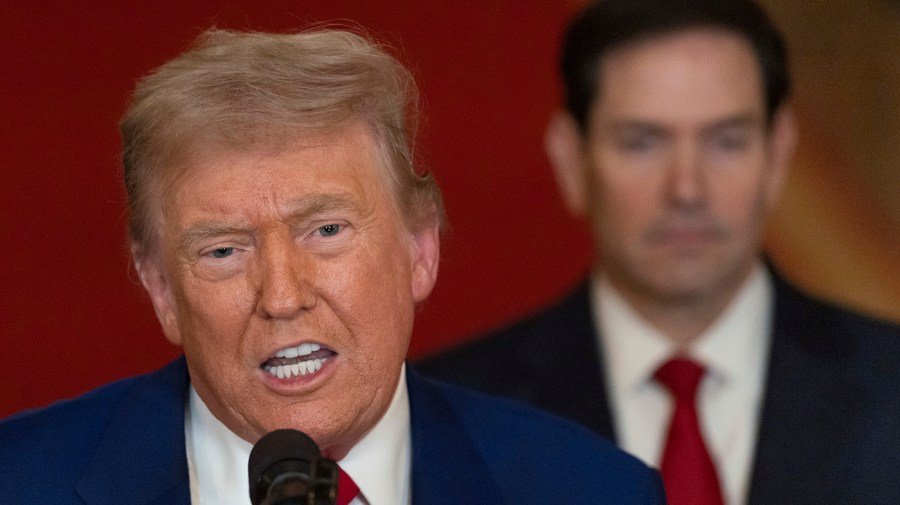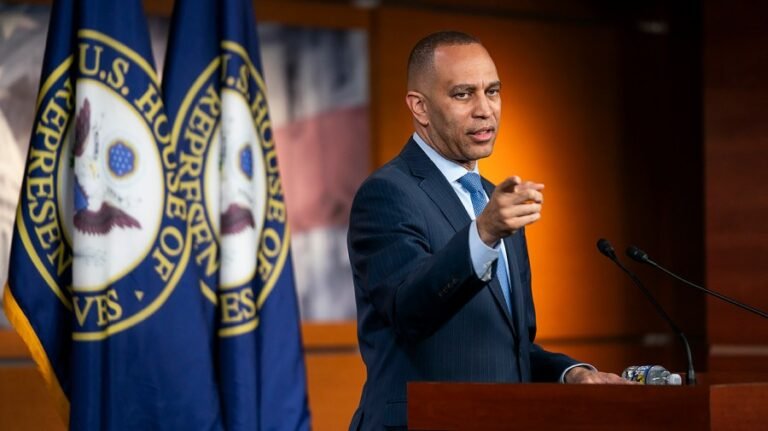
Morning Report is The Hill’s a.m. newsletter. Subscribe here or in the box below:
A ceasefire between Israel and Iran appeared to be in jeapordy early Tuesday, hours after both countries said they agreed to terms outlined by President Trump to halt their 12-day war.
Trump has pushed for a quick end to the Middle East conflict, signaling a desire to move on after the U.S. carried out bombings of Iran nuclear sites over the weekend and Iran retaliated by hitting a U.S. base in Qatar.
Israel’s military said early Tuesday it detected another Iranian barrage hours after the start of the ceasefire — underscoring the dangerous state of what the president predicted would be a pause in fighting “forever.”
The acceptance of a U.S.-brokered deal by both sides came after Iran’s military denied launching a final onslaught of missiles targeting Israel, which Israel said killed at least four people early Tuesday morning. Israel launched a blitz of airstrikes targeting sites across Iran before dawn, The Associated Press reported.
The exchange of strikes continued hours after Trump hailed the phased ceasefire plan knitted together after a flurry of phone calls with help from intermediaries. He told NBC News he did not believe Israel and Iran “will ever be shooting at each other again.”
Israel said in a statement just after 3 a.m. ET and 10 a.m. local time that it achieved all of its objectives in the 12-day conflict “and in full coordination with President Trump, Israel agrees to the President’s proposal for a bilateral ceasefire.”
“Israel will respond forcefully to any violation of the ceasefire,” the Israeli government warned.
Trump, who surprised lawmakers and many in his administration with his ceasefire announcement Monday on social media for what he called the “Official END” to the war, later returned to Truth Social to declare the ceasefire in effect.
“PLEASE DO NOT VIOLATE IT!” the president posted, hours before he was set to depart the White House to travel to the Netherlands to participate in a NATO summit.
Privately in conversations with Trump and others on Monday, Prime Minister Benjamin Netanyahu agreed to the plan, provided Israel was not subject to further attacks from Iran, The New York Times reported.
▪ NBC News: How the ceasefire came together, according to the White House.
▪ The Hill: Here’s how Iran could retaliate against the U.S. if diplomacy fails.
Secretary of State Marco Rubio on Monday spoke with Israeli Strategic Affairs Minister Ron Dermer, a top aide to the prime minister, according to Israel’s Channel 12, to convey that the U.S. sought to wrap up the conflict after bombing Iran’s missile sites. Dermer replied that Israel was close to achieving its objectives.
Trump announced the ceasefire hours after Iran fired missiles at the largest U.S. military base in the Middle East on Monday in retaliation for the United States bombing its nuclear enrichment facilities. The president said the agreement called for Iran to initiate a 12-hour ceasefire, and if it held, to be followed by a 12-hour ceasefire by Israel’s military.
Earlier Monday, the president on social media thanked Iran for communicating a heads-up ahead of what he called Tehran’s “very weak” missile strikes, intercepted by Qatar on paths aimed at Al Udeid Air Base. The president suggested Iran’s leaders might have “gotten it all out of their ‘system.’”
Trump, who authorized U.S. military intervention after the administration failed to persuade Iran to abandon its nuclear ambitions, said the war with Israel could have been long “and destroyed the entire Middle East, but it didn’t, and never will!”
It is unclear that a ceasefire can deliver Trump’s objective, shared with Israel, to prevent Iran from possessing a nuclear weapon. Many analysts believe Iran will retreat, reassemble its nuclear scientists and rebuild its program.
Vice President Vance told Fox News on Monday that the war appeared to be “effectively over,” opening the door to “build a long-term settlement” between Israel and Iran. He asserted that Tehran “doesn’t want to keep on fighting.”
The U.S. and its allies continue to assess the impact of the bunker-buster bombs dropped on three of Iran’s nuclear facilities, a military operation that Trump says “obliterated” Iran’s enrichment program. Others eyeing the results are not so sure, report The Hill’s Mike Lillis and Mychael Schnell.
U.S. officials and the International Atomic Energy Agency concede they do not know the whereabouts of Iran’s stockpile of roughly 880 pounds of near-weapons-grade uranium.
“Our goal was to bury the uranium and I do think the uranium is buried,” Vance told Fox, arguing that thwarting Iran’s enrichment capability and preventing conversion of uranium to a nuclear weapon were U.S. objectives that were achieved in the past week.
Trump on Monday sent Congress a legally required memo saying the U.S. bombings he authorized against Iran last week were intended “to advance vital United States national interests, and in collective self-defense of our ally, Israel, by eliminating Iran’s nuclear program.”
A lasting ceasefire, Rep. Thomas Massie (R-Ky.) told reporters on Monday, would end his push to get a House vote on a bipartisan resolution to reassert Congress’s war powers. The debate about legislative authority over mobilization of U.S. military forces to attack Iran has divided both parties on Capitol Hill.
“If the ceasefire holds and we’re not engaged in hostilities, then it’s a moot point,” he said. “I wouldn’t need to bring it to the floor. I just spoke with the Speaker about that.”
The GOP lawmaker’s willingness to publicly challenge Trump over legislation and congressional authority has frustrated the president, who now backs a political PAC to try to unseat the Kentucky Republican.
Massie, interviewed on MSNBC on Monday, said Trump made no mention of U.S. objectives while announcing a ceasefire agreement, which he said “doesn’t mention anything about what our bombing of Iran was predicated on, which is destroying a so-called nuclear program.”
“Well, does this mean that Trump’s a party to the ceasefire?” Massie added. “He says that Iran and Israel are. I hope the United States is as well, because if it’s not, we’re going to have to push this [resolution of authority] through Congress.”
▪ The Hill: 12 House Democratic military veterans support a war powers resolution.
▪ The Hill: The global economy remains braced for effects tied to the Iran conflict.
SMART TAKE with BLAKE BURMAN
To cut rates or not to cut, that will likely be a major question facing Federal Reserve Chair Jerome Powell when he testifies today before the House Financial Services Committee. It’s a regular update to Congress, but it comes at a delicate time for the central bank.
Even as President Trump was pondering bombing Iran’s nuclear sites on Friday, he took time to swipe at Powell, posting in part, “Maybe, just maybe, I’ll have to change my mind about firing him? But regardless, his Term ends shortly!” Powell has said data and conditions determine interest rates, and politics is not a factor.
In the past few days, two Fed officials both mentioned the possibility of cutting rates in July if conditions warrant. That is likely only going to raise questions later today about whether Powell agrees.
Burman hosts “The Hill” weeknights, 6p/5c on NewsNation.
3 Things to Know Today
- Tens of millions of people across the Midwest and the mid-Atlantic are under heat alerts as dangerous temperatures continue.
- Amazon’s second batch of internet satellites reached low Earth orbit on Monday, ramping up competition with SpaceX’s Starlink.
- A Nebraska slaughterhouse is offering ergonomic workstations and no night shift to attract American employees as the immigration crackdown threatens its traditional labor force.
Leading the Day
MEGABILL RUSH: Senate Majority Leader John Thune (R-S.D.) still aims to have the GOP’s “big, beautiful bill” on Trump’s desk by July 4, but the party faces several obstacles as is races to meet that goal.
Republican senators are moving quickly to work out their disagreements over Medicaid, renewable energy tax breaks and other provisions before the bill comes to the Senate floor on Thursday or Friday.
But senators emerged from a closed-door briefing on the status of the megabill Monday night saying some of their biggest hurdles remain.
Massive spending cuts to Medicaid have been a particularly difficult issue to work through, writes The Hill’s Alexander Bolton. Senators, who have warned for weeks that the spending cuts passed by the House will have a devastating impact on rural hospitals and reduce health care coverage in their states, say they have yet to see a plan from their leadership that they could support.
“I still have concerns about a few provisions in the bill. I’m not satisfied yet,” said Sen. Jerry Moran (R-Kan.), who cited Medicaid as his biggest problem with the legislation. “Broadly, Medicaid, related to the well-being of hospitals in Kansas and rural America.”
Despite their multiple disagreements, Senate Republicans would be glad to get the sprawling legislation through the chamber quickly to get it out of the political spotlight.
The longer they take, the more time Democrats have to take shots at it. They’re accusing their Republican colleagues of cutting vital federal programs to offset the cost of cutting taxes for wealthy individuals and corporations.
Some of the megabill’s most controversial provisions have also had to undergo a so-called “Byrd bath” to be eligible for inclusion in the reconciliation package, which the GOP can advance with a simple majority.
Over the last few days, Senate Parliamentarian Elizabeth MacDonough has rejected several provisions in the GOP bill, complicating the process. Here’s a look at what didn’t make the cut.
Thune announced Monday that the upper chamber will remain in Washington until it is able to pass the ambitious package, raising the chances of scuttling a planned recess next week.
“We’re on schedule,” Thune said Monday. Asked if he has the votes to pass the legislation, he replied: “Let’s hope so.”
▪ The Hill: Senate parliamentarian rejects offshore oil, gas drilling provisions in GOP megabill
BIDEN DOC TO TESTIFY: House Republicans in the coming weeks plan to speak with Kevin O’Connor, who oversaw former President Biden’s health as his personal physician while in the White House.
O’Connor agreed to be deposed next month by the House Oversight and Government Reform Committee as part of a GOP investigation spurred in part by revelations about Biden’s ebbing physical condition reported in the book “Original Sin.”
The Hill: Messaging app WhatsApp has been banned on congressional staffers’ government devices.
Where and When
- The president is scheduled to depart this morning for the annual NATO summit, held at The Hague in the Netherlands. Trump is scheduled to arrive at 7:45 p.m. local time for a greeting with King Willem-Alexander and Queen Máxima at the Royal Palace, followed by a NATO family photo at 8:20 p.m. and dinner with leaders at 8:30 p.m. Trump is expected to remain overnight for Wednesday’s session.
- Vice President Vance is scheduled to headline a fundraising dinner in Lima, Ohio, to benefit the Ohio Republican Party, held at the Veterans Memorial Civic and Convention Center.
- The House will meet at 10 a.m.
- The Senate will convene at 2:15 p.m.
Zoom In
HOLD FOR DECISION: Justices are set for a momentous week as the Supreme Court enters the homestretch of decision season, racing to finish its work by the end of the month.
The high court is slated to make headway on Trump’s birthright citizenship order, LGBTQ-themed books in schools and racial gerrymandering.
Justices also are still dealing with several emergency cases filed by the Trump administration concerning its efforts to reshape the Education Department and federal bureaucracy.
The Hill’s Zach Schonfeld breaks down what’s left on the docket.
DEPORTATION: On Monday, the Supreme Court lifted judge-imposed limits on the Trump administration’s deportations to countries where migrants have no ties over a scathing dissent from the court’s liberal justices.
The administration warned that U.S. District Judge Brian Murphy’s injunction was endangering immigration officials stuck in Djibouti guarding a group of convicted criminals, who were destined for South Sudan until Murphy blocked the flight.
The majority did not explain its reasoning in lifting the ruling. In a 19-page dissent, the three liberal justices said their colleagues were “rewarding lawlessness.”
▪ The Hill: The Supreme Court won’t weigh Louisiana direct sales ban challenged by Tesla.
▪ The Hill: The Supreme Court turned away Virginia’s appeal in felon voting ban lawsuit.
▪ The Hill: Florida’s attorney general asked the justices to pave the way for new immigration law.
NEW YORK: Empire State voters today will reckon with the hotly contested New York City Democratic mayoral primary. Can progressive state Rep. Zohran Mamdani pull off an upset against former Gov. Andrew Cuomo? Will another Central Park Five member be positioned for the city council? The Hill’s Jared Gans shares what to watch for today.
Meanwhile on Monday, Gov. Kathy Hochul (D) announced that New York state will build the nation’s first major nuclear power facility since 2009, to be located upstate. Trump signed an executive order last month to “reinvigorate” U.S. nuclear energy, including by accelerating construction of new reactors and boosting domestic mining and enrichment of uranium. Hochul, who is seeking reelection, did not provide budget details.
Elsewhere
IRAN CONFLICT LOOMS OVER NATO: The NATO alliance, led by Secretary-General Mark Rutte, is aiming during its summit in The Hague this week to satisfy Trump’s big defense spending goal. But the meeting is likely to be dominated by the tentative ceasefire between Israel and Iran.
“Iran is going to be a big deal at the summit,” one European diplomat told Politico. “It’s not a NATO topic per se, but leaders are going to want to talk to Trump about it.”
The two-day gathering is also intended to signal to Russian President Vladimir Putin that NATO is united, despite Trump’s previous criticism of the alliance, and determined to expand its defenses to deter any attack from Moscow.
“Ask any European leader whether they believe that the United States is as committed to Article 5 today as it was a year ago, and you will hear an unequivocal no,” Michael Carpenter, who oversaw Europe policy in the Biden White House, told The New York Times, referring to the collective defense principle core to the alliance.
Rutte was more optimistic on Monday.
“Let’s not kid ourselves, the security situation has dramatically changed over the last couple of years,” he said, referring to Russia’s invasion of Ukraine. “When that call comes, we stand there together, united, not only in spirit, but also in practice.”
▪ The Wall Street Journal: NATO aims to boost defenses against drones, hacking and sabotage. Allies intend to spend more on nonlethal measures to secure homelands and troop deployments.
▪ The Washington Post: U.S. strikes on Iran upstage a NATO leaders summit tailored for Trump.
▪ The New Yorker: How Trump got NATO to pay up.
SHORING UP SUPPORT: Ukrainian President Volodymyr Zelensky arrived in London on Monday to press for more military support for his embattled nation. The meeting came hours after a major Russian drone and missile attack on Kyiv.
Zelensky said discussions would focus on coordinating with Ukraine’s allies — likely a reference to ceasefire negotiations — developing joint weapons production projects and tightening sanctions on Moscow.
The Ukrainian president will not attend the NATO meetings in The Hague this week, but Rutte insisted allies maintain a “clear commitment” to Kyiv.
▪ Politico: Trump doesn’t want Ukraine in NATO, but the rest of the alliance is keen to keep the door open.
▪ The New York Times: World Central Kitchen, the charity founded by the celebrity chef José Andrés, resumed operations in Gaza after almost seven weeks because of Israel’s aid blockade of the enclave.
Opinion
- NATO is worth paying for. Trump is right that Europe needs to do more, by The Washington Post editorial board.
- In Iran, is it over when Trump says it’s over? We’ll see, by John Authers, columnist, Bloomberg Opinion.
The Closer
And finally … 🥾 What is an “irresponsible hiker,” and should such explorers be compelled to pay the costs of their rescues? One sheriff who sees plenty of lost and injured Mount St. Helens hikers recently decided “yes.” A mayor in Japan also favors that idea. It’s not a new debate. Hikers, climbers, skiers and outdoor adventurers err and put themselves in danger. Who should pick up the tab when their plight costs communities money?
Sheriff Summer Scheyer of Washington state’s Skamania County is drafting legislation that would fine people whose reckless or negligent actions lead to a rescue, based on the idea that those costs, sometimes including helicopters and teams of volunteers, soared by 400 percent in May compared to just a year ago. The new conclusion: Rescued adventurers should help alleviate the financial burden experienced by the county when they receive assistance.
“America probably won’t get a major search and rescue (SAR) overhaul until more people die in the outdoors,” writer Marc Peruzzi predicted more than five years ago in a report published by Outside.






